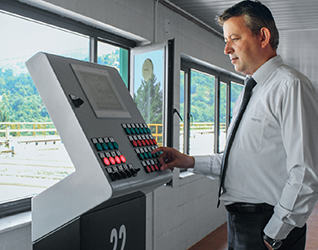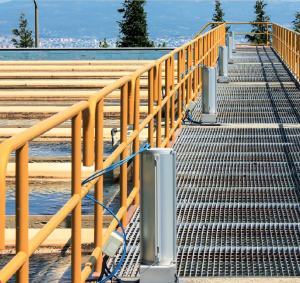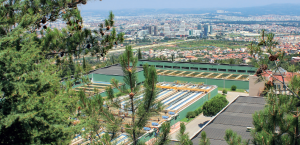
Fresh water for Bursa means optimizing treatment plants
Mike Edwards
Features festo optimization water treatment Orhan Ayhan of Festo Turkey
Orhan Ayhan of Festo Turkey With a population of 2.8 million, Bursa is the fourth biggest city in Turkey and needs approximately 700,000 cubic metres of fresh water every day. In order to optimize the supply of drinking water, the local municipal water company BUSKI recently modernized its water treatment plants.
The 28 newly automated filter basins in the Dobruca water treatment plant can treat up to 500,000 cubic metres of water every day – more than two thirds of the city’s drinking water needs.
The modernization project had five main goals: increased operational reliability through automation and simultaneous reduction of the costs of water treatment by decreasing the consumption of rinsing water and filter sand. The requirements for the new plant also included the fast detection of faults using sensors and preventive maintenance for smooth operation.
A demand-based metering system was installed for adding chemicals to the water. This metering system (e.g. for adding chlorine) ensures that the water tastes better and that any health risk for consumers is kept to a minimum.
Lastly, BUSKI wanted to simplify and optimize operation of the plant through specific training courses for its staff.
Roadmap towards the goal
Festo, together with the planning engineers at BUSKI, started by drawing up a needs analysis based on the requirements, which included all the key stations for the treatment process: the filter basins, the metering system, the clarifier, the sludge thickener and chlorination.
The result was an impressive concept that met all the requirements, such as full automation, smooth operation, simple maintenance as well as employee training.
State-of-the-art technology
All 28 sand filters can now be operated fully automatically; each filter has been equipped with a new control panel and a pneumatic control cabinet with modular, electrical CPX terminals. The main electrical control cabinet has also been replaced. The obsolete actuator technology for the process valve has been replaced by pneumatic linear and quarter turn actuators from Festo. At the same time, the compressed air network was replaced and customized.
Each filter basin is now controlled using valve terminals. The added chemicals are metered using a system based on the CPX automation platform which automatically adapts the amount to be added to the amount of water flowing through the plant. All of this data is
transferred to the SCADA system.
Monitoring and control with SCADA
The new SCADA system, which has a redundant design for the purpose of data security, monitors the entire process, collects the process data and uses this data to automatically create various status reports for preventive maintenance or operational tasks previously carried out manually.
Different parameters can now be read out centrally via SCADA so that employees no longer have to laboriously record values on site, such as pressure, level, process valve positions, replacement dates for filters or pump operating hours. The entire plant can be efficiently monitored from the SCADA control centre, the new control room complete with video wall, thanks to the installation of a fibre-optic communication network throughout the plant.
Training needed
Another key element of the tender process was employee training.
300 hours of training by Festo Didactic are included as part of the contract. The training programme will enable the plant operators to effectively operate a plant comprising mechatronic and pneumatic components. Bringing together theory and practice, skills and knowledge are passed on using process-relevant stations. Upon completion of the training, employees will receive a certificate from Festo.
Training on the job – for a whole year
Festo will also permanently assign a member of staff to monitor the plant for a whole year. This staff member from the Festo national company in Turkey will ensure smooth operation, will intervene should a malfunction occur and immediately rectify it. The staff member will also show BUSKI employees how to efficiently operate, maintain and repair the fully automated plant.
Systematic approach to success
German quality, the Festo brand and of course the proposed technology were decisive in Festo being awarded the tender by BUSKI. Modernization projects already completed at ISKI, the largest water company in Turkey, were points in favour of Festo’s competence.
It quickly became clear that the Festo approach using pneumatic components was the most promising: the concept focused on reliable and clean technology in a simple system design with suitable actuators and valves, which is simple to operate and maintain and also works reliably.
The engineering competency of the experts from Festo Turkey and the support offered were further positive points for Festo. Other compelling reasons for the managers at BUSKI to choose this concept were the relatively low costs for a fully automated plant, the structured training schedule and the operating support during the first year of operation.
The result? Automated quality and economic efficiency
The end-to-end automation has met BUSKI’s requirements for the new treatment plant. There has been a significant improvement in water quality – as well as in the efficiency of water treatment. Filter sand and rinsing water losses have been reduced to a minimum. Automation of the process valves ensures that all treatment processes in the plant are reliably carried out.
This article was contributed by Festo Canada.
Print this page

